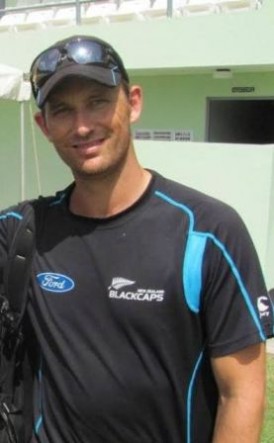Preparation is massive for a fast bowler: Shane Bond
Ganeshbabu Venkat |
Cricket Web caught up with the Blackcaps bowling coach Shane Bond during their recent tour of West Indies at Dominica ahead of the two T20 matches in July.
Do you think fast bowling is a dying art today? How can you compare fast bowlers between today and yester-years?
I don’t think it is dying or going down. I think there are enough quality bowlers out there. Dale Steyn has got 350-plus Test wickets, James Anderson has 350-plus and Stuart Broad has close to 250 wickets. The difference between now and say the 70s and 80s are that there is so much more cricket played today. For instance Sir Richard Hadlee played 86 tests over 17 years, whereas players today play that in less than 10 years. The quantity of cricket played varies and because of the existence of various formats and the leagues. In addition there is more ODI cricket and T20 cricket coming along. So everyone wants to keep their assets, which are their fast bowlers fit so it may appear that there are not enough fast bowlers as it was in the yester-years, but I still think there is enough quality out there.
How much can a bowling coach offer to the players in terms of personal and technical expertise?
In my case, it’s a range of different things I offer to different people. For some guys it’s about the technical aspect of fast bowling, for others it’s an extra set of eyes watching what they’re not aware of and they don’t notice and provide suggestions. Over the course of time it can change from person to person. At the end of the day, my job is to get the best out of them, correct mistakes and make them happy and make sure that they are performing to produce better results for New Zealand.
How do you as coach motivate fast bowlers? Especially in Tests, given the fact that there is so much potential for bowlers to earn lots of dollars by signing up for T20 leagues instead of toiling in the heat for five days?
I have to say, I’m lucky with this group. They don’t need the extra motivating. They are up for it all the time. All they need is support, tactical advice and how they go about things that we discussed in training sessions and from my experiences on various surfaces. I feel we have come a long way from not beating England at home a couple of years ago and beating India and West Indies on the last day of the Tests to win matches. That shows that this group is motivated enough since they learnt from the England experience (Laughs). As far as the motivation goes though, I have got a group that is hungry, especially the Test group and I don’t think they need any external factors to motivate them.
How is preparation important for a fast bowler?
Massive. Because of the stress they go through, especially the guys who play all three formats. If they don’t look after themselves they are not going to last long. The three quicks we have Trent Boult, Tim Southee and Neil Wagner are outstanding when it comes to looking after themselves and they are very durable. We have had the same three guys for the last two years barely with an injury. That’s credit to the work they put in to look after themselves on and off the park. They have set an example for young guys coming in to the team. So it’s massive and you have to be willing to put in the extra effort to last long.
How would you recommend using the short-ball? It’s a weapon if used properly, what are your thoughts on that?
We have talked about using it more and more, how to use it, when to use it, especially in ODI cricket. I think it’s a continuous development process. Nobody likes a bouncer going past their nose, that’s what we try to do, bowling in an aggressive manner and I think it has worked pretty well for us. But at the same time using it often can be counterproductive too.
Rules are skewed more and more in favor of the batsmen. If there is one thing that you would want to change so that cricket can adapt and create a favorable playing field for bowlers too, what would that be?
It’s a good question. I don’t mind the current rules for Test cricket, because the bowlers always sub on and off. If there is something that I would like to see in ODI’s and T20’s, I would like to see a player subbed for a bowler, who can be rested. Sort of like a DH (Designated Hitter) role in baseball. Then fast bowlers can come on, bowl their quota and be replaced. I think that is an area that can be looked in to. Having said that, the rules have always been changing in cricket especially ODI?’s and the bowlers as a group have embraced it and have made the best use of the situation. Otherwise I don’t mind what they have now, whatever the rules are you have to adapt to it and get stuck in to it.
Can you briefly talk about your playing career? Your fitness issues and why you had such a curtailed career and a case of potentially what could have been?
Basically, it was just the way I was bowling and my body struggled to cope up with bowling the amount of overs I did, particularly when I bowled long spells in Test cricket, roughly 30 overs a week flat out. Once I did that, I got in to the danger zone and got injured. Also when I was younger I had a bad run of back injuries and started late for Newzealand and never really had a massive grounding of good number of overs under my belt. I suppose it was a combination of whole different things that contributed to the stress fracture, the surgery and the aftermath. Nevertheless, that helps me in this job though. I can empathize with the bowlers in the current squad with what I had gone through and help them get over niggles and injury issues. Yes it was pretty frustrating, but still I had pretty good fun.
You started off as an out and out fast bowler capable of bowling yorkers at will, do you think if you had modified your approach to bowling by cutting down some pace and focusing more on line and length like Glenn McGrath, you could have had even better results?
Good question(Laughs). By the time I had back surgery at thirty, I knew that I was never going to have a long career anyway. I lasted till I was 34. Yes, in hindsight I could have made myself better in terms of longevity by pulling back the throttle a little bit from time to time, but that was just me. I always felt I offered the best to the team and that role was to bowl fast and that is when I felt I was most effective and that is what I always tried to do.
You played the IPL and ICL, Is that something that you enjoyed? What did you have to do different from bowling 15-20 overs a day and just going all out for four over bursts?
I enjoyed it. Even in our current group we have a bunch of guys who have played T20’s across the world; Corey Anderson, Jimmy Neesham to name a few. I totally enjoyed playing in different conditions, the chance to mix with different players, different physios and different training staff and to see different ideas. I would encourage the guys, if they get the chance to grab that opportunity to do these things. It’s great for their development, it’s great for their cricket and sometimes as a young cricketer coming in to the scene, when you get a chance to mingle with great players, it helps break down the element of fear and it will be good for their future. I had a great time, good fun and hopefully I get to do more from a coaching perspective in these leagues.
What was your best moment in your playing career?
When we won the 2002 Test series here (in the Caribbean) it was pretty good. We won the first Test at Barbados in 2002 that was pretty amazing. Any of the Test wins that I was part of were pretty special. Then of course you feel satisfied when things clicked for you on a personal level which is cool as well. I think any game that we won as a team was pretty satisfying for me. I really cannot single out a particular moment.
What would you rank as your best bowling spell?
(After a long pause) I would say probably the second to last day of the Test against West Indies in 2006 at Eden Park, Auckland. I think they were cruising along in the fourth innings and in one spell I got three wickets, including Brian (Lara) out for a golden duck. We went on to win the Test match the next day and I finished with a 5fer. That spell was probably as best as I bowled anytime during my career.
How are you enjoying your current role? What are your short to mid-term goals given that New Zealand are co-hosting the World Cup next year?
Winning the World Cup is what I want to do. Winning is what it’s all about; I think you take a great deal of satisfaction by seeing players develop and improve. I have been in the job for two years, there was a learning curve but I think I have got a good handle on it now. It feels good to look at the likes of Southee, Boult and Wagner develop in front of you and feels good when you have contributed to it. It has been a fun two years and it has given me great satisfaction working with this team. I think I’m due to work till the end of the World Cup and we will see how it goes beyond that.





Leave a comment